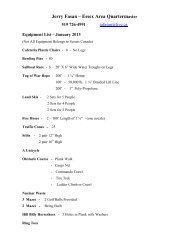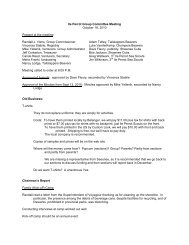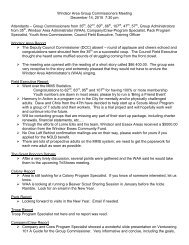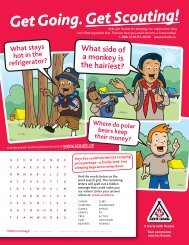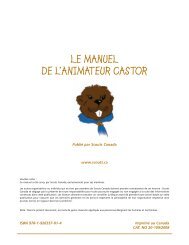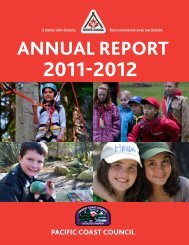Beaver Leader's Handbook - Scouts Canada
Beaver Leader's Handbook - Scouts Canada
Beaver Leader's Handbook - Scouts Canada
You also want an ePaper? Increase the reach of your titles
YUMPU automatically turns print PDFs into web optimized ePapers that Google loves.
2-4<br />
Adult leaders should not:<br />
4 Show favoritism for particular youth members.<br />
4 Invite youth member(s) alone to your home or other private accommodation.<br />
4 Have private talks with individual youth members away from the presence of other <strong>Scouts</strong><br />
or adults.<br />
4 Carry one youth member alone in your vehicle.<br />
4 Go on a hike or other activity with one youth member alone.<br />
4 Demonstrate first aid on a youth member.<br />
4 Assist youth members with personal hygiene or dressing, except where health or disability<br />
requires it, and then only in the presence of another adult.<br />
4 Take part inappropriately in body contact games.<br />
4 Let children involve you in excessive attention-seeking behaviour that is overtly physical or<br />
sexual in nature. Be particularly careful with the very needy child. Re-direct the behaviour<br />
to “healthy” activities and provide caring attention before it is asked for.<br />
11. General Duty<br />
Every adult’s responsibility goes beyond the confines of his or her specific appointment to their<br />
own youth. Adults are expected to intervene when they identify breaches of any part of this<br />
Duty of Care document.<br />
There are three primary areas of responsibility: to the parents, to youth, and to yourself.<br />
11a. Responsibility To Parents<br />
At the simplest level, parents have a right to know everything that their daughter or son is<br />
going to be involved in. Of course, they have the right to say no if they feel any activity is inappropriate.<br />
Parents are also your greatest ally, and you should keep them as well informed as<br />
possible. Parents will sometimes defer to you, but only if you have convinced them that you<br />
merit their confidence, and have earned their trust and respect.<br />
The best way to start achieving this trust is to talk with each parent. The initial visit with parents<br />
when a youth first joins your section is critical for future relationships. This visit takes time,<br />
effort and commitment, but it is well worth it. Discuss with the parents what Scouting is about,<br />
its Mission and Principles, program, weekly meetings and special events. Allow them to question<br />
you. It is better to deal with issues and concerns that parents may have in a relaxed setting,<br />
rather than later in a “crisis” situation.<br />
Where unsupervised activities take place, they are done with a parent’s/guardian’s written<br />
approval (e.g. <strong>Scouts</strong> or Venturers camping alone).<br />
Take a personal interest in their child and communicate<br />
regularly, simply and clearly with parents.<br />
Knowing parents personally is a great asset.<br />
11b. Responsibility To Youth<br />
By knowing each individual young person, you’ll be in a<br />
better position to anticipate how the youth may react in various<br />
situations. In physical activities, you may get fears and concerns<br />
being expressed which are easy to understand, but you may<br />
also get displays of bravado covering up real fears. In intellectual<br />
activities, you may get questions if a person does not understand,<br />
but you may also get disruptive behaviour as a way of saying the<br />
same thing.



